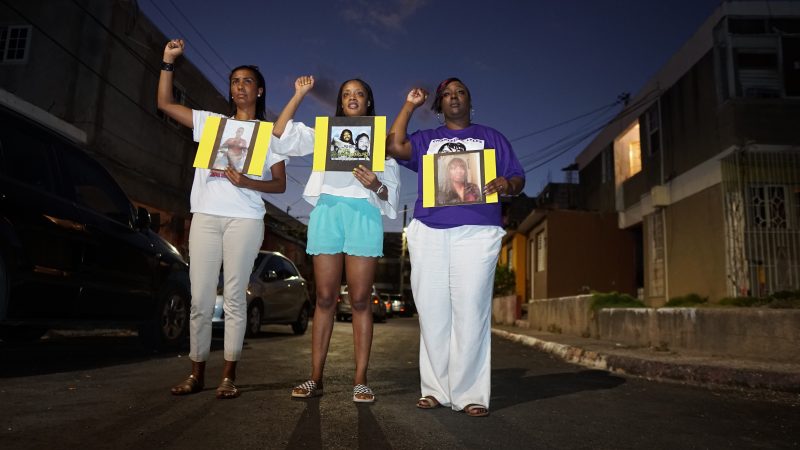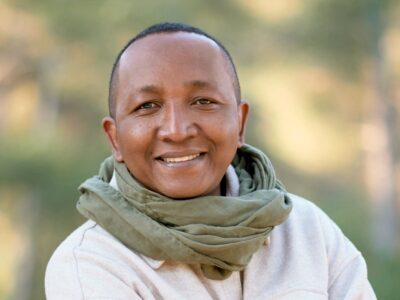
(L-R): Ana Paula Riveira (Brezila), Shackelia Jackson (Jamaika), ary Katrina Johnson (Etazonia) ao Kingston, Jamaika, mihazona ny sarin'ny hava-tiany namoy ny ainy. Zon'ny mpamorona, Amnesty International/Mario Allen, nahazoana alalana.
Ity no fizarana faharoa amin'ireo andiany telo izay mampiseho vehivavy telo–avy ao Karaiba, Amerika Atsimo sy Amerika Avaratra–nampiarahan'ny zava-niainana iombonana tamin'ny fahalasanan'ny hava-tiany noho ny herisetran'ny polisy.Vakio ato ny fizarana voalohany.
Nihaona tamin'ireo namany roa vao haingana- Shackelia Jackson avy any Jamaika sy Katrina Johnson avy any Etazonia – Kingston, renivohitr'i Jamaika i Ana Paula Oliveira, Breziliana mpikatroka ny zon'olombelona. Anisan'ny tao anatin'ny hetsiky ny Amnesty International, A Journey for Justice in the Americas (Andro ho an'ny Rariny ao Amerika), izay mifantoka amin'ny tolona ataon'ny fianakaviana manana hava-tiana novonoin'ny polisy ireo vehivavy ireo.
Na dia samihafa aza ny fisehon'ny famonoana tsirairay nataon'ny polisy, dia samy nahatsapa izy ireo fa ilaina ny manohy ny ady ho an'ny rariny ho an'ny tenan'izy ireo, ny fianakavian'izy ireo ary ireo rehetra izay ao anatin'ny toe-javatra mitovy amin'izany.
Ankoatra izay, amin'ny faritra Amerika Latina/Karaiba manana ny taham-pamonoana ambony indrindra manerantany, mitady hanohana ny fomba famaizana ataon'ny polisy ny hevitry ny daholobe, araka ny fanadihadiana toy ny Tatitra LAPOP an'ny Oniversite Vanderbilt/USAID. Mila fanohanana bebe kokoa avy amin'ireo rafi-pitsarana ao amin'ny fireneny tsirairay avy, ary avy amin'ny fiarahamonina amin'ny ankapobeny koa ireo vehivavy toa an'i Ana Paula, Shackelia ary Katrina ireo.
Lasa mpikatroka malaza manohitra ny herisetran'ny polisy ao Brezila i Ana Paula Oliveira taorian'ny nahafatesan'ny zanany lahy 19 taona Jonatha tany Rio de Janeiro tamin'ny May 2014, izay nolazain'ny polisy tamin'izany fa “fifandonana mitam-piadiana” nifanaovana tamin'ny mponina. Tamin'ny fotoam-pitsarana farany mikasika ny raharaha tamin'ny taona 2016, nanambara ny manampahefana iray fa mpanao trafika rongony i Jonatha, fiampangana izay nolavin'ireo vavolombelona dimy teo amin'ny fitsarana. Mitovy ny fitantarana nolazain'izy ireo tamin'ny fitsarana: nitifitra vahoaka ny polisy, nahavoa an'i Jonatha, izay sendra nandalo teo fotsiny.
Na dia niteny tamin'ny alalan'ny mpandika teny iray aza izy, dia azo noraisina tsara, manokana sady azon'ny rehetra manerantany ny hafatr'i Oliviera: “Rehefa miady ho an'ny rariny ho an'ny zanako lahy aho, dia mahatsapa fa mbola mikarakara azy.”
Oliveira (AO) niresaka tamin'ny Global Voices (GV) momba ny tolony:
AO: On May 14, 2014, it was around 3:30 p.m. when Johnatha left home to take his girlfriend to her home. On his way back home, there were police officers doing surveillance in the area and there was an altercation between them and some residents from the community. Police officers allegedly fired shots in the air to disperse the crowd. There were a lot of people on the street. At this moment, Johnatha was passing by and was shot in his back, fired upon by a police officer from the Police Pacification Unit in the favela of Manguinhos. Later on, during the legal process, we were informed that Alessandro Marcelino de Souza, the policeman that shot Johnatha, was already being accused for previous crimes — three homicides and two attempted homicides. When my family and I knew that Johnatha was dead, it was very painful and we became angry, because besides all the suffering and pain, we had to prove that Johnatha was innocent. Police officers said that Johnatha was a suspect, but it's not true.
AO: Tamin'ny 14 Mey 2014, manodidina ny 3ora sasany folakandro, niala ny trano mba haka ny sipany tany an-tranony i Johnatha. Rehefa niverina nody tany an-trano izy, dia nisy polisy nanao fanaraha-maso tao amin'ny faritra ary nisy fifamaliana teo amin'ireo polisy sy ny mponina sasany tao amin'ny fiarahamonina. Voalaza fa nitifi-danitra ny polisy mba hanaparitahana ny vahoaka. Marobe ny olona teny an-dalambe. Tamin'izany fotoana izany, nandalo i Johnatha ary voatifitra teo an-damosiny, notifirin'ny polisy manamboninahitra avy ao amin'ny Sampan'ny Polisy Mpampandry Tany any amin'ny favela (faritry ny mahantra) ao Manguinhos. Taorian'izay, nandritra ny fizotry ny fitsarana, nampahafantarina anay fa i Alessandro Marcelino de Souza no polisy nitifitra an'i Johnatha, ary efa voaheloka ho nanao heloka bevava teo aloha – famonoana olona telo sy fikasana hamono olona roa. Rehefa fantatro sy ny fianakaviako fa maty i Johnatha, dia tena naharary izany ary tezitra izahay satria ankoatra ny fijaliana sy ny fanaintainana, dia tsy maintsy nanaporofo izahay fa tsy nanan-tsiny i Johnatha. Nilaza ny polisy fa olona iahiahiana i Johnatha, saingy tsy marina izany.
Namariparitra ny antony nahatonga azy hanohy ny fanentanana izy:
It is important to do this in his memory. I needed to tell the truth. I needed to show everyone that his case was not an exception. Every day, black young men are killed by the police in favelas and other marginalised areas. While I’m still alive, I will fight. I know that when I raise my voice it is not only for my son — it is also for all the other families that suffer as I do and that can’t fight for justice. If I don’t fight, I will become sick and die. When I fight for justice for my son, it makes feel like I’m still taking care of him. It’s like I’m still experiencing motherhood for him.
The strength comes from the love that I feel for him. It comes from the support from my family and the support from mothers in the same situation. It comes from the support of other mothers that have the same will to fight for justice, the same will to fight against impunity of agents responsible for the enforcement of law. Even feeling pain, it is important to contribute, even with a small part, to make mothers transform the grief into fight. It is important to help them to become the voice of their sons.
Zava-dehibe ny manao izany ho fahatsiarovana azy. Mila milaza ny marina aho. Mila mampiseho ny rehetra fa tsy miavaka ny tranga momba azy. Isan'andro, mamono tovolahy mainty hoditra ao amin'ny faritra iva sy ny faritra hafa atao an-jorom-bala ny polisy. Raha mbola velona aho dia hiady. Fantatro fa rehefa manandratra ny feoko aho dia tsy ho an'ny zanako ihany – fa ho an'ireo fianakaviana hafa rehetra mijaly tahaka ahy sy tsy afaka hiady ho an'ny rariny. Raha tsy miady aho, dia ho marary sy ho faty. Rehefa miady ho an'ny rariny ho an'ny zanako lahy aho dia mahatsapa fa mbola mikarakara azy ihany. Tahaka ny mbola miaina ny maha-reny ho azy aho.
Avy amin'ny fitiavana tsapako ho azy ny tanjaka (ananako). Avy amin'ny fanohanan'ny fianakaviako sy ny fanohanan'ireo renim-pianakaviana mitovy tranga amiko izany. Avy amin'ny fanohanan'ireo renim-pianakaviana hafa izay manana faniriana mitovy hiady ho an'ny rariny ihany koa, hiady amin'ny tsimatimanota an'ireo tompon'andraikitra misahana ny fampiharana ny lalàna. Na dia mahatsapa fanaintainana aza, dia zava-dehibe ny fandraisana anjara, eny fa na dia amin'ny ampahany kely aza, mba hahatonga ireo renim-pianakaviana hanova ny alahelo ho tolona. Zava-dehibe ny manampy azy ireo mba ho lasa feon'ny zanany lahy.
GV: Afaka milaza faritra iray ahafahana miady amim-pahombiazana ny olan'ny famonoan'olona tsy misy fitsaràna ao Brezila ve ianao?
AO: Strengthening laws is important, Nevertheless, in Brazil, some laws exist but are ineffective. If the public authorities and mechanisms of control were effective in their roles, other killings would not have happened. If there was the commitment of our judicial system, there wouldn’t have been other killings. It is sad to realise that when police officers are sued, the victims are judged instead. It is clear enough for the relatives of victims that the judicial system is unequal.
AO: Tena zava-dehibe ny fanamafisana ny lalàna, Na izany aza, ao Brezila, misy ireo lalàna sasany saingy tsy mahomby. Raha mahomby amin'ny asan'izy ireo ny tompon'andraiki-panjakana sy ny rafitra fanarahamaso, dia tsy nisy ny famonoana hafa. Raha nisy ny fanoloran-tenan'ny rafi-pitsarantsika, dia tsy nisy famonoan'olona hafa. Mampalahelo ny mahita fa rehefa toriana ny polisy, dia ireo niharam-pahavoazana indray no tsaraina. Mazava ho azy ho an'ny havan'ireo niharam-boina fa tsy mitovy ny rafi-pitsarana.
Niantso ny Breziliana namany mba hahatakatra lalina kokoa sy hiombom-pangorahana amin'ny manjò ireo mponina atao an-jorom-bala i Oliveira:
In theory, there is no death penalty in Brazil. However, we can see the armed hand of the government deciding who is going to live who is going to die in favelas and other marginalised areas. People are being executed. Families are being destroyed. It is sad to realise that part of our society supports all this. When someone celebrates the death of a resident in a favela, he or she is also responsible for the murder, and have blood on their hands. Don’t be indifferent. The fight must be for life!
Amin'ny teoria, tsy misy ny fanamelohana ho faty any Brezila. Na izany aza, azontsika jerena ny tanana mitam-piadin'ny governemanta manapa-kevitra hoe iza no ho velona, iza no ho faty any amin'ny faritra (havoana) iva sy any amin'ny faritra hafa atao an-jorom-bala. Novonoina ny olona. Nopotehana ny fianakaviana. Mampalahelo ny mahita fa manohana izany rehetra izany ny ampahan'ny fiarahamonintsika. Rehefa misy olona mankalaza ny fahafatesan'ny mponina ao amin'ny favela, tompon'andraikitra amin'ny famonoana ihany koa izy, ary tia mandatsa-drà. Mihevera. Tsy maintsy ho amin'ny fiainana ny tolona!
Mandritra izany, mbola mitombo ny famonoana ataon'ny polisy ao Jamaika. Ny 1 aprily 2018, Jamaikana 31 no maty novonoin'ny polisy, ka telo maty voatifitry ny polisy tao amin'ny paroasin'i Md James (izay Fanjakana latsaka an-katerena amin'izao fotoana izao) tamin'ny fety Zoma Masina.
Tany Brezila tamin'ny taona 2016, polisy manamboninahitra – anisan'izany ireo manamboninahitra tsy miasa – no nahafaty olona 4.224, fitomboana 25% ao anatin'ny herintaona monja. Niteraka fihetsiketsehana mieli-patrana sy fitakiana ho an'ny rariny (anisan'izany ireo olo-malaza Afrikana-Amerikana) ny fitifirana vao haingana mpikatroka ambony.
Ary any Etazonia, namintina tamin'ny fanehoan-kevitra avy amin'ny Kaomisera Jamaikana Margarette May Macaulay, Mpitatitra Manokan'i Etazonia ny famotoran'ny Filan-kevitra Iraisan'ny Samy Amerikana momba ny Zon'olombelona (IACHR) tamin'ny Desambra 2017, izay “nanambara fa olana ao amin'ny ny tanindrazany ao Jamaika ihany koa ny herisetran'ny polisy. Nandrisika an'i Etazonia izy mba hanangana rafitra fanaraha-maso mahaleotena amin'ny heloka bevava ataon'ny polisy, ivelan'ny rafi-pitsarana ara-dalàna, araka ny natsangan'izy ireo manokana vao haingana tao Jamaika. Nandrisika an'i Etazonia ihany koa izy mba hanatsara ny fampiofanana, hanome fanarenana feno ho an'ireo niharam-pahavoazana, ary koa hijery ny olan'ny fahazoana mora mividy basy.”
Rehefa nanontaniana ny fahatsapany momba ny ho avy, ho an'ny tenany sy fireneny i Ana Paula dia nanamarika hoe:
I have to believe in better days. I have to have hope.
Tsy maintsy mino ny andro tsara kokoa aho. Mila manana fanantenana aho.






